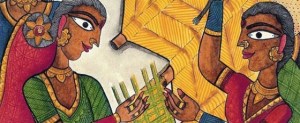
In the world’s largest democracy, men are still very much in control.
Even though we’ve had a woman as prime minister (Indira Gandhi) and the current president is also a woman (Pratibha Patil), women still lag way behind men in many ways. India has only 21 women in the 233-member Rajya Sabha or upper house of parliament. In the Lok Sabha or lower house, women represent 11 percent of the seats. That ranks India 99th in the world in female parliamentary representation – behind neighbors Pakistan and Bangladesh.
On Monday, which was International Women’s Day, the United Nations blamed a gender gap for the disappearance of 43 million women in India. Lost because of lack of health care, decent nutrition and proper education (only 55 percent of women are literate in India.
Gender bias leads to the killing of infant daughters. Brides are still burned to death in hopes of securing another dowry.
Those are obvious ways discrimination rears its ugly head. I can remember acts that were more subtle, yet insidious none the same.
The women in my mother’s generation cooked all the meals in the house but rarely sat with the men at the table. The men, of course, were served first; the women waited on them and then cleaned their mess.
Women on their periods could not enter a place of worship. I did not understand why when I was a teenager and wanted to join in on the puja festivities at my grandparents’ house. Now I am sure a man insisted on that rule.
My great aunt, who lived to a very ripe old age, was married and widowed when she was still in her teens. She lived a life of austerity, wrapped in white muslin, eating strict vegetarian food by herself on the floor of the kitchen. Somehow, she had been dishonored because her husband died on her. If she had been born a few years earlier, she might have had to plunge into her husband’s funeral pyre to save herself.
My own mother’s marriage was arranged. She left her own family to live with strangers. She gave up her own ambitions, her dreams in life to do what was expected of her. She was not a stalwart feminist. Nor was she one to complain about the way women were treated in Indian society. But I know, from all our quiet conversations, that she endured. And she told me many years ago that she would never wish the same for me.
Prime Minister Manmohan Singh recognized the uphill climb for women in India.
“Our women faced discrimination at home, there is domestic violence, they face discrimination in equal access to education and health care,” he said this week. “There are all these things. All these things have to end if India is to realise its full potential.”
A bill was introduced 15 years ago reserving one-third of parliamentary seats for women. The male-dominated Rajya Sabha finally passed the bill on Tuesday. It next goes to the Lok Sabha for approval.
There’s a long journey still ahead but the bill is a crucial first step to giving Indian women the voice they so richly deserve.
My mother died nine years ago. But I know she would have been proud of her homeland on this day.

不勞而獲的事情,並沒有價值........................................
LikeLike